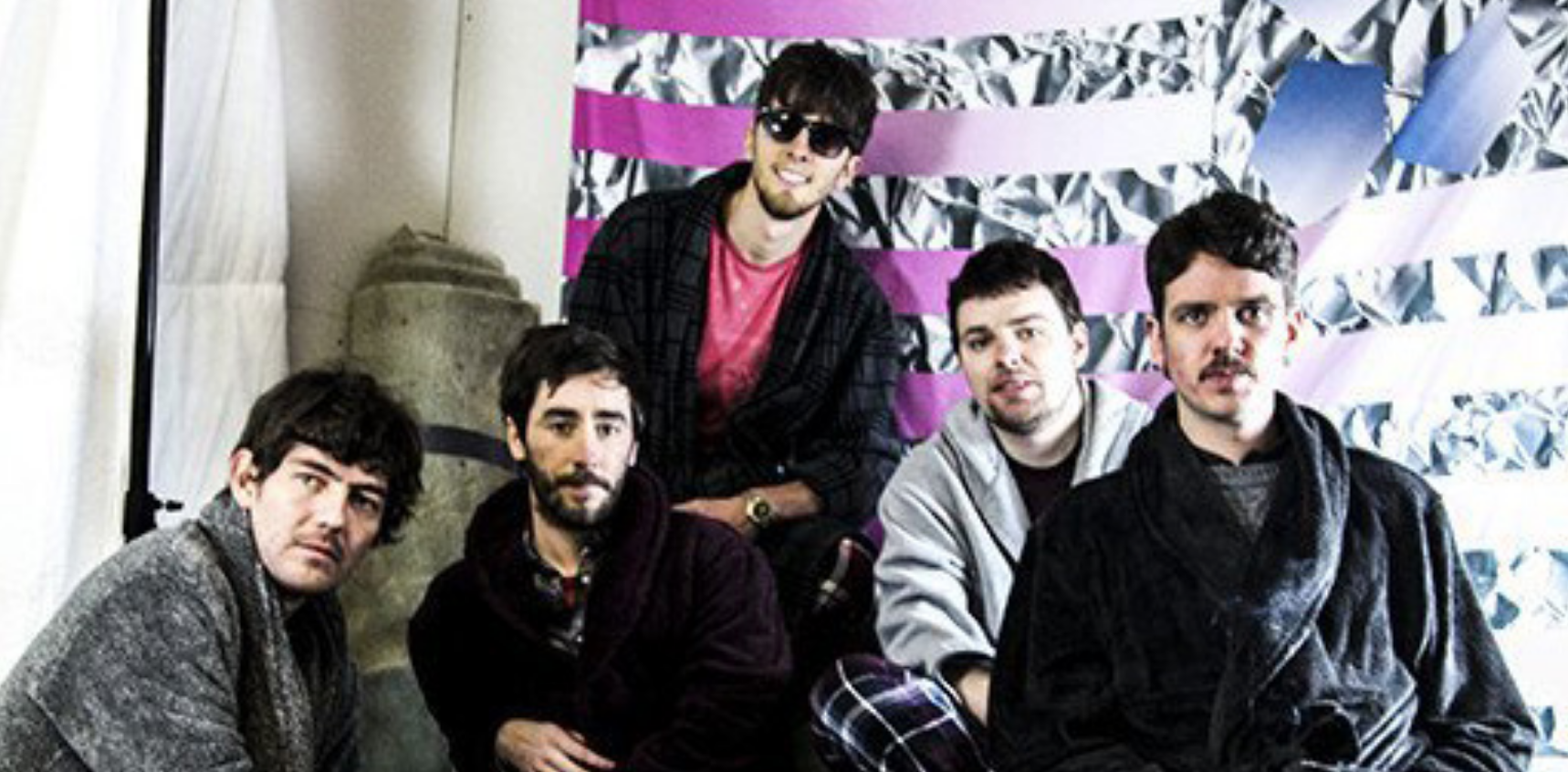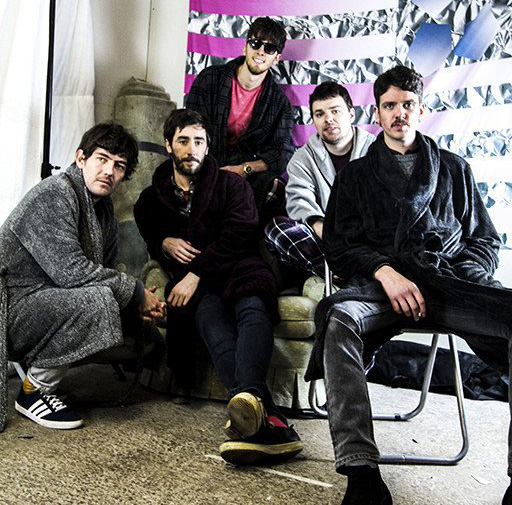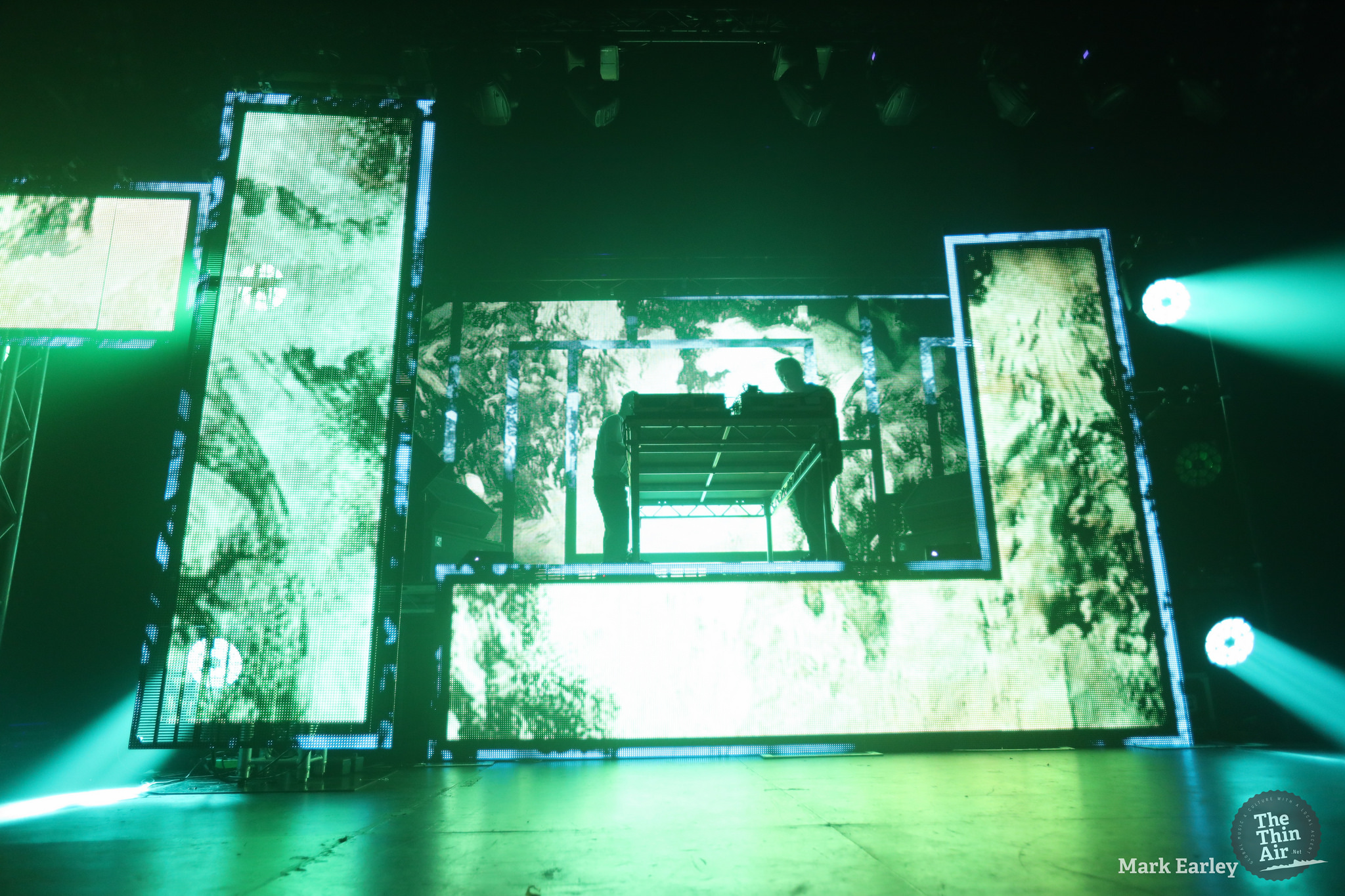Almost a decade ago, O Emperor released their debut record Hither Thither to critical acclaim. From there, the Waterford-bred quintet would go on to constantly redefine how bands in Ireland could record and share music without, forever shirking the limits and binds of being tied to a major label. From the grandiose psych-folk of their debut to the weird, gritty krautrock, komische, garage rock and psych of Vitreous and the Lizard EP, the five-piece have proved themselves time and time again to be a group who have defied expectation at every turn. The outfit’s announcement in September that they would be disbanding, while disappointing to the rest of us, did just serve once again to prove that defiance.
To mark the release of their third and final album Jason, which will be supported by a handful of farewell shows around Ireland, Zara Hedderman spoke to guitarist and vocalist Paul Savage about secret albums, Art Garfunkel and calling time on one of Ireland’s most beloved, strange and unforgettable acts.
Have you and the guys been reflecting on the last decade of O Emperor as the final shows draw closer?
“We’ve been doing a few interviews over the last while and that side of things has been thrown upon us. I don’t think we’re really a group that gets very nostalgic. I mean, we reminisce together about certain funny moments and it’s great to have a reason to look back on stuff, now. Naturally enough, we’d be slow to give ourselves a pat on the back but it’s been nice to be reminded of certain things and say to yourself, ‘Oh yeah, we’ve done a few bits!’ You’re generally thinking about the next thing or about the present so it’s been good to have this time.”
Will you miss being in the band?
“Yeah, definitely. I always loved the build-up on the day of a show; running around, getting things together and then the show itself, of course. I’ll definitely miss that. Even when we weren’t doing stuff or there’s been a lull, you miss playing. In saying that, you certainly don’t miss the moments where you’re racking your brain with what you should and shouldn’t be doing in terms of the industry side of things. I won’t miss that.
“Doing it for so long, though, we’ve naturally relaxed about that end of things. Going forward, we’ll still be playing music, individually. There’ll be more stuff keeping us going than it being a case of us sitting around missing the band.”
How has it been working the older material in with the new songs when creating a setlist for the final shows?
“It’s been fun. We haven’t dipped too much into the older stuff because we want to push on and perform the new album. We’ve done a few shows, over the year, where we included songs from Lizard and they worked well with the new songs. With these three final gigs, we felt that we had to go back a little further and play some tracks off Hither Thither. It’s weird to be playing something like ‘Sedalia’ followed by a Jason song. It feels like two very different bands. It’s nice, though, because that album was written in eight or nine years ago. It’s interesting to see how something can progress to where we’re at now and hear those different things in a live setting.”
A lot of Jason feels like it was recorded live. Can you tell me about the process of making the record?
“Yeah, everything was pretty much recorded live. The basis of the tracks on the album are live jams, essentially. They’re not exactly start-to-finish songs, per se. Some are sections that we took out of a ten or twenty-minute session. There’s a whole world of madness that we’ve saved people from hearing.
“For example, we took two or three minutes of a section and it became ‘Make It Rain’. Phil (Christie) overdubbed some vocals on to that instrumentation and a few synth lines were played over it. That’s how a lot of the album was done. We tried to keep that rule as much as possible. Although, we broke it with some songs where we’d take a section of the jam from say the two-minute mark and stitch it together with what was happening at the ten-minute point. We’d only do that, though, when we thought there was a good dynamic between the arrangements. Where a song started quietly we’d find a muscular part and put them together, structurally. Sometimes, we’d add some trickery in post-production but the essence of Jason is very much so a live album.”
Is it more challenging way to record an album that way? I’ve watched several documentaries and interviews where musicians emphasise how difficult it can be to record tracks live in the studio.
“It’s difficult when you’re trying to do it live and you also want to get the end-result to sound big and polished in the same way as if you had multi-tracked or recorded it meticulously. It can be very hard to capture the spontaneity and get everything to sound really good. We abandoned the notion of everything having to sound good, sonically, quite early on!
“We went purely for spontaneity and spirit instead of worrying about fixing bum-notes. We just accepted that those imperfections would be included. Going back to the editing process, if there was a section that we liked from the jams we had to take them for what they were, warts and all. If you liked what was going on with the drums and bass but someone on the guitar or keyboard messed up, you were forced to take them, as well. That was an interesting hinderance to work with. Most of the time, you had to go, “Fuck it, that’s just the way it’s going to have to be!” There’re some moments when you’re listening to the songs and wondering what’s going on but that’s exactly the character we wanted to bring into the album.”
How many hours worth of recording from those sessions did you have to choose from for the final edit?
“It’s interesting, even though it took a long time for the album to come out, we actually recorded those sessions relatively quickly about three years ago. They’d been sitting around for ages and it was the process of getting it together that took the longest.
“Those sessions were done, sporadically, over the course of a year. Ultimately, they came down to four or five sessions, in total, over four or five evenings. Within those five sessions there’s roughly twenty-hours of us playing. We went through the majority of those tapes but you couldn’t go through all twenty-hours of it.
“There’s a lot there in the recordings. There’s definitely the makings of a weirder, alter-ego brother of Jason in the really shit jams. We find them very funny, though. We were kind of joking with the the idea of putting them out as a secret album; the really ridiculous stuff. I think most of that material will be kept mostly for personal stuff, however.”
On ‘Make It Rain’ there’s a an evident Afrobeat influence on the melody and throughout the record there are nods to the 1970s and Frank Zappa, also. Was there a notable shift in the music you were listening during the recording of the album?
“Yeah, definitely. Even from the Lizard EP we noticed that there was a shift in being less introverted and less moody. Perhaps that’s a result of getting older; your tastes and overall outlook change.
“When you’re in your early twenties, you tend to lean towards the darker side of writing. Around the time of Lizard, we got into a lot of old-school funk and afro-rock. That stuff has come up more in the last few years with YouTube. I suppose that’s one of the good things about algorithms. When you search something like William Onyeabor, you’re suddenly opened up to all this afro-rock stuff and then you spend hours going down a rabbit hole.”
The longer you spend on that trip the more obscure the suggestions become.
“Exactly. You start off with afro-rock from the 1970s and then you’re suggested some Thailand funk from the 1980s and you’re like, “Ok I’ll give that a go!” You find yourself exploring lots of weird musical avenues. That was definitely an influence on us and it got us out of the usual stalwart listening of Radiohead, Wilco, and Elliot Smith. They’re all brilliant but there’s something about those artists where you listen to them constantly until you reach your late twenties and then you flourish out to other stuff. I guess that’s where that shift came from for us.”
I wanted to hear about the inclusion of skits and vocal effects that are scattered throughout the album. Where did the idea for those newer elements stem from?
“We had some hip-hop influences creeping in and we wanted to make a body of work that was very much true to an album format; where the songs effortlessly flow into each other. We wanted to put it together like a mixtape, almost. For the first time, I think we finally hit the nail on the head with something that sounds like it’s completely together and not just a hodgepodge of songs put together under the banner of the band.
“One day, Brendan (Fennessy) came across these bizarre ramblings of Art Garfunkel. I don’t know if I should be giving out the secret, but basically, it’s a very funny video on YouTube from a documentary with Art Garfunkel in the studio. He’s going on these amazingly ridiculous rants about his songs; talking about them in a cosmic, spiritual way. But really, he’s just talking about a very straight-up, rock and roll beat and he’s completely blowing it out of context by talking about it how spiritually it moves him. It’s brilliant to listen to and think, ‘What fucking planet are you on?’ The producer and the players are also in the studio just looking at him going, “It’s just a rock and roll song. It’s so easy to do, just play the thing!’”
“A lot of it came from that. After a while, it started to make sense to have this character of a guy, at the beginning and end, who’s hanging around in the background. Then some of the other random stuff came from various phone ramblings that we robbed off WhatsApp messages. Essentially, it’s stuff we wanted to include to capture the spirit of a bunch of lads messing. That’s the ethos behind how we made Jason.”
That inherent playfulness was an element of the record that I loved, and it made the album so much fun to listen to. I kept getting an image of a living room or garage filled with a group of friends gathered together to play music.
“That’s pretty much what is was like, actually! It literally was just a garage and a bunch of lads messing. That was always the band, though. Sometimes, I guess musicians can be guilty of masking that side of being in a band. Essentially, bands are made from friends meeting up and having fun. When they go on the PR stuff and have to talk about the album, that’s when things become serious. That’s fine, also. Sometimes the finished piece has a tone where it shouldn’t be surrounded by jokey or slap-dash discourse. This time around, we wanted to let the natural character of the group out and not be so po-faced and just let the stupid side of things out. Hopefully it holds up without being too gimmicky.”
It’s very much an anti-establishment album, in many ways. It’s an honest portrayal of your chemistry as both a band and a group of friends. Although, you could imagine that a lot of labels would be terrified by an album like Jason. In the past, O Emperor had a major label backing the music but it seems as though you’ve made more of an impact following your own instinct. Have you enjoyed the freedom of doing it on your terms?
“Yeah definitely. Since we’ve been left to our own devices, I feel it has progressively gotten better. With Lizard and Jason, I suppose Vitreous was done ourselves although we had a few other people who worked on that with us, we let go of having to pursue the record-promote-tour cycle. Don’t get me wrong, I still enjoy doing that but circumstances, now, have guided us in a certain way. It’s incredibly liberating to say, ‘Fuck it, we don’t actually have to sing to anyone’s tune’. There’s no, ‘Ah ye should probably do this.” We can just say, ‘No, we don’t have to’.
“I think people have to look at what they’re doing and understand that it actually doesn’t matter whether you release music out one way or another. Once it gets put out and you enjoy what you’re doing, that’s what matters.”
Do you get aspiring bands approach you for advice?
“Not a whole lot, no! Maybe they’ve seen the trajectory and thought, “Maybe I shouldn’t ask them!”
“In saying that, we’re always happy to tell people how it is. When you talk to most musicians, when you meet them in the pub, they’ll always have stories and say what it’s like. However, you can’t always get on your soapbox and publicly say what you really think. Bands need to embrace the fun of playing music. They should enjoy themselves and not be so pernickety about who they’re playing with or where everything is going. It doesn’t have to go anywhere. Being in the moment and playing is where you should be. People are often thinking about the next year or how to progress after that. When really, it’s better to enjoy it, get your music out and think about next year when you get there.”
Does the Irish music industry supports and nurtures emerging talent, in your opinion?
“It’s always been a tricky one because it depends on the day. You could be like, “This is a load of rubbish”, and then there are times when you realise that it’s what you make of it yourself. Instead of moaning, you get out and do whatever you need to. It’s incredibly hard, though, for Irish acts to make a proper living out of it and it has to become a hobby. We’d make no bones of that. That’s essentially why we’re saying that this is going to be our final album. We all have different jobs and careers and families, now. We can’t commit to the travelling, promotion and all of the work that goes into doing this anymore because it doesn’t pay. That’s the truth of it, unfortunately.
“Ireland is just too small. Even if radio stations and the press sing your praises, that’s not going to pay the rent. If you’re selling out The Olympia Theatre, you’re still not going to be covering your rent for very long. You need to get to a point where you’re turning over at least two or three grand a month. It’s hard to do that as a musician in Ireland.”
“If you want to play every weekend in either a wedding band or a covers band, then you’ll probably be able to pay your rent. People are still living in a bubble thinking that by doing all this stuff that it’s a progression. However, the only progression we’ve seen from the acts that have made it is by going to the UK first or to America very early on in their career to crack those markets. If they can do that, they’ll return as a household name. If they don’t or even when bands make it big in Ireland, it’s really hard because there’s a roof here that stops them going any further.
“Getting back to where we’re at right now, you have to either be comfortable with it being a very enjoyable hobby or you can work ferociously hard at it. The best thing you can have is the courage to do it early on and not wait too long because it becomes increasingly difficult.”
Will you continue writing music outside of O Emperor?
“Oh yeah, absolutely. I’ve written a lot of songs that have been sitting around for a long time. I need to motivate myself to do something with them. There’s no doubt that we’ll always be involved in music. Alan and Brendan are active as working musicians. They’re playing in a lot of different things, at the moment. Brendan is also producing and involved in the engineering side of things in the studio. Phil has The Bonk, and myself and Richie have different projects that we’ve always been working away on. There’ll always be something going on to keep us all going. To be honest, we’ll probably always have a connection of some of us playing together in different outfits. The end of O Emperor is more of a new chapter instead of calling it a day on something.”






